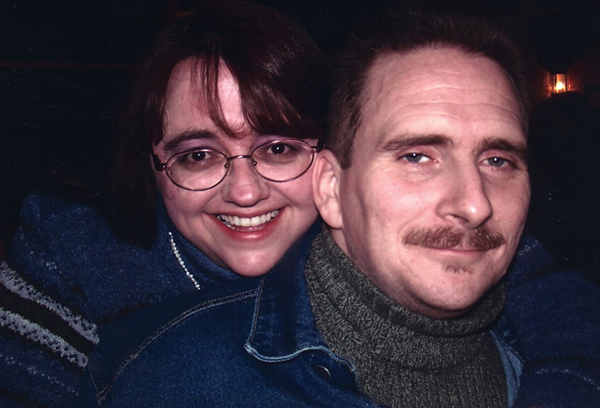John Meurs
Lessons from a life transforming accident
(PDF
expanded version)
 By
Ann Hauprich
By
Ann HauprichBeing confined to a wheelchair doesn’t prevent teacher John Meurs from standing tall in the eyes of his students and fellow educators.
It was a beautiful Saturday afternoon on September 13, 1980 when the life of John – who was 16 and had just started his junior year at high
school — changed in an instant after the car in which he was a passenger spun out of control, slamming into a tree.
John, who had not fastened his seatbelt after taking his place behind the teenaged driver in a 1978 Chrysler Cordova that was also carrying
three other friends — was ejected through the back window and then thrust forward into the vehicle, breaking his neck in the process.
“I knew instantly that I was paralyzed,” recalls John, who does not let the challenges of being paralyzed from the chest down (in medical terms, a C5-6 quadriplegic) stand in his way as he instructs seventh and eighth graders at Lisha Kill Middle School in Colonie.
Rather John Meurs towers as a Power of Example of perseverance at the head of his classroom where there’s no room for Stinkin’ Thinkin.’ One can only imagine the look his adolescent students get from him when they whine that something’s “not fair.”
Fortunately, muses John, his parents didn’t offer whining as an option during his recovery. Instead, Joyce and David Meurs, who had previously motivated their son to improve his cliff diving and dirt biking skills, now encouraged him to push his physical endurance to the limit throughout months of rehabilitation that required him to re-learn every basic life skill possible for his level of injury.
Rebuilding his bodily strength was not enough for John’s parents, however. They saw to it that he had ample opportunity to flex his scholastic and spiritual muscles as well – though the transformation was far from a miraculous overnight occurrence.
“Everybody talks about the stages of grief that people go through after an injury like mine which, let’s face it, entails many losses. I never went through those stages. There was no shock, denial, bargaining or any of that. I went straight to anger. I was 16, paralyzed and pissed off. I definitely believed what happened to me was not fair.”
Asked at whom he was most angry, John insists there was nobody in particular. “I wasn’t mad at the driver. Both of his arms were broken in the accident. He felt terrible about my injuries and blamed himself for what happened to me. He was going through hell in a different way. I didn’t see any point in him walking around with all that guilt for the rest of his life and I told him that I didn’t blame him. The two passengers in the front with him also suffered bumps and bruises and the girl who was in the back with me got whiplash and a back injury that bothers her to this day,” says John. “I wasn’t angry at any of them. I was just pissed in general.”
When a “core group” of mutual friends would come to visit John in the hospital, they would help him numb his emotional pain by “sneaking pot and booze” past the nurses. “Remember,” he quips, “it was the eighties.”
When John’s substance abuse was discovered, it was decided he needed psychological help. This went over like a lead balloon as the psychiatrist who was assigned to John’s case “broke the first, last and only straw” when he asked his young patient: “How are WE doing today?”
After sending the psychiatrist packing, John continued to try to look for ways to numb his pain and wasn’t especially grateful when tutors were secured to help him catch him up on assignments he had missed due to his injuries. In spite of himself and the eight months and three weeks of school he missed while confined to Albany Medical Center, John – who has a documented genius IQ — successfully completed his junior year just two weeks before the start of his senior year in 1981.
In retrospect John is glad that his parents insisted that he return to regular classes to complete Grade 12, but at the time, it was a hellish experience. “It was like being at the center of a freak show,” he says, unable to count the number of times his well-meaning fellow classmates joked about the feats he could accomplish if only his wheelchair had a gas-powered motor.
As John recollects, it was around March of his senior year that his mother told him to find a college because he wouldn’t be living with his parents come September of 1982. “My Mom was the Queen of Tough Love – both before and after my accident. I can’t say I liked it very much at the time, but in hindsight, I’m grateful that she stood her ground. I respect my Mom because she always made me and my brother Stephen and sister Rena reflect on our actions and how we planned to do better in the future.”
John also credits his father, David, as being the creative genius of problem solving when it comes to living with a disability, tackling any and all complications with equipment and modifications. Dad David, he says, would be considered a modern day MacGyver due to his technical knowledge and his ability to fix or build anything that was needed.
 Although John’s wife Lisa (nee Bopp) wasn’t yet on the scene, she has since
gotten to know her mother-in-law well and describes her in somewhat different
terms: “Joyce Meurs is a remarkable woman of great strength and fortitude. As
terrifying as it may have been for her, Joyce knew she had to push John to a
life of independence.”
Although John’s wife Lisa (nee Bopp) wasn’t yet on the scene, she has since
gotten to know her mother-in-law well and describes her in somewhat different
terms: “Joyce Meurs is a remarkable woman of great strength and fortitude. As
terrifying as it may have been for her, Joyce knew she had to push John to a
life of independence.”Exactly when he stopped being “angry at nobody in particular”, John isn't certain, but he thinks the “acceptance” stage finally began to gradually kick in after he uncharacteristically blew up at his mother for reasons he is now sure were stupid. Her response: “My mother simply disengaged the motor on my chair and wheeled me into my room. I was told I could come out when I could be civil. It was the handicapped version of being grounded, I guess. I remember sitting there thinking: ‘Why did I yell at her? Why am I being such a dick to everybody – my parents, my brother, my sister?’ It began to slowly dawn on me that being pissed off is an incredible waste of energy. Once I figured out on my own that being angry was counter-productive …I mean, it was getting me absolutely nowhere . . . things began to change for the better. Did that mean I suddenly liked being in a wheelchair? No, of course not! It’s been nearly 35 years and I still don’t like being in a wheelchair. It sucks! I live it every day. But I don’t let it ruin my life. I’ve got stuff to do and so I focus on what I can do instead of on what I can’t do.”
Bottom line: John began classes at the State University of New York at Albany in the fall of 1982 — living on campus and hiring an attendant to help him in the mornings and evenings. “John quickly earned a reputation with some of his professors, who in turn approached John and suggested he become a teacher,” says Lisa, who wed John in 2007 and is looking forward to traveling with him to public speaking engagements in the future.
Completing his Bachelor of Arts, John graduated cum laude in December 1987. Upon earning his Masters degree in 1998, John set out to substitute teach and find a career teaching middle school children social studies. At the same time, he helped Stephen run a now defunct family business. (John took care of the administrative details, as well as doing similar work at a friend’s business.)
If this weren’t enough, John assumed the added responsibility of working with the New York State Department of Transportation to educate the public about wearing seat belts and helped to get the seat belt laws implemented in NYS.
John began spending what little free time he had giving school presentations to children about spinal cord injuries and the need for helmets when riding bikes and skateboarding. John always made it a point to encourage questions about his disability -- which he answered in terms students could understand. In all, he reached about 10,000 young minds with his message.
“It’s ironic,” muses John. “I had shattered my left foot in the town pool a year before my accident and did all kinds of crazy, stupid stuff when I was riding my dirt bike in the gravel pits near my home. The last place I ever expected to get hurt was in a car. But again, it was 1980 when the car I was riding in hit a tree. There were no seat belt laws. Today, if you get into a car and don’t buckle up, you’re breaking the law. Kids need to hear that the law isn’t in place to restrict their freedom, but to protect them.”
In recognition of his extraordinary service, John received the Outstanding Citizens Award from Schenectady County Stop-DWI in 1994 and the Albany Jaycees award for being one of the Top 10 New Yorkers in 1995. It was at the turn-of-the-millennium that John was hired to fill the full-time teaching position he now holds in Colonie. He’s typically up and at ‘em by 6:30 a.m., out the door and in his wheelchair-accessible van by 7:30 a.m. and at the school by 8 a.m. in plenty of time to monitor homeroom activities between 8:15 and 8:30 a.m. His schedule requires John to teach 110 students per day – two sections of seventh graders and three sections of eighth graders, a total of five classes of students ranging in age from 12 to 14 years. Make that five classes plus a study hall. And, of course, the day doesn’t end when the bell rings at the end of the day. There are papers to grade and tests to score at night.
But John Meurs wouldn’t have it any other way – which is one of the reasons why he was honored as an outstanding educator by Ch. 13 WNYT. The day broadcast journalist Elaine Houston visited with the television cameraman, John was teaching a class with 28 students. To motivate them to behave, he reminded his adolescent students that “your grandparents will be watching this segment.”
John’s achievements were earlier documented in print when an article titled “Driving Ambition” was published in a leading NYSUT periodical in May of 2006.
That story included the following passage by writer Clarisse Butler Banks: “ Meurs runs his classes — where students regularly have open discussions about politics and history — with the four D’s: dialogue, discourse, debate and discussion... Every situation can be a learning experience, he noted. “I’ve made huge mistakes. I’m paralyzed because I made a bad choice,” Meurs said. “Let’s get beyond the bad choice, learn from the mistake, and not make excuses. I have a great life...”
